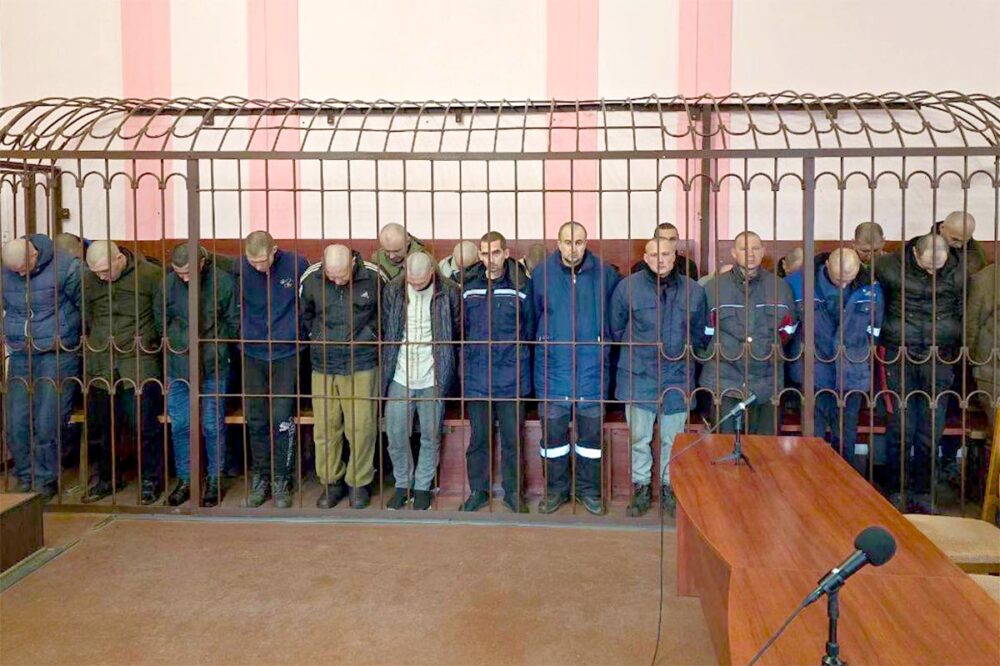On January 16, Alexander Bastrykin, head of the Investigative Committee of Russia – one of the main law enforcement agencies in charge of prosecuting criminal cases – gave his traditional start of the year interview to state news agency RIA Novosti. This year, his attention was focused on the work of investigators in the occupied Ukrainian territories.
According to him, Russia started investigating “crimes of the Kyiv regime” almost 10 years ago. “But as time has passed, we have a concrete result. More than 200 Ukrainian servicemen have been sentenced by courts to long prison terms, including life imprisonment, for committing murders of civilians, cruel treatment of civilians and prisoners. Among them are several dozen members of the banned Azov regiment,” Bastrykin said. He added that Russia has launched more than 4,000 criminal cases against Ukrainian servicemen since 2014. Bastrykin said he regularly visits the occupied territories, and that his last operational meeting was held in Mariupol, in late December 2023.
Bastrykin does not specify whether the data refer only to the occupied territories or to Russia as a whole, but judging by the figures and the context of the interview, we can conclude that his office counted precisely the sentences in the occupied territories.
March 2023: The first three convicted
The data shown by Bastrykin on Russian trials was confronted with that collected by Justice Info, based on public information, about the sentences handed down by the so-called Donetsk and Luhansk Supreme Courts. Certainly, the Donetsk court sentenced Ukrainians before the Russian annexation, but only five such cases are publicly known. Russia handed down the first sentences to Ukrainian prisoners of war in the occupied territories in early spring 2023, more than a year after Russia launched its all-out invasion of Ukraine.
On March 10, 2023, the Supreme Court of the Donetsk’s People Republic (DNR) passed a sentence on Azov battalion fighters Viktor Pohozey and Vladyslav Shel. They were found guilty of ill-treatment of the population and the use of prohibited methods in an armed conflict. The Russian Investigative Committee reported that Pohozey allegedly assaulted one of Mariupol's local residents, while Shel fired five shots at an elderly man from an observation post. Pohozey was sentenced to 8.5 years of strict regime, and Shel – 18.5.
On the same day, the Luhansk’s People Republic (LNR) Supreme Court passed the first sentence on Maxim Butkevich, a platoon commander of the Berlingo special battalion of the Armed Forces of Ukraine. He was found guilty of double murder and intentional damage to another person's property in a generally dangerous way. The Russian investigation reported that on June 4, 2022, he took up a position in a house in Severodonetsk, from where he saw civilians in the house opposite and fired an anti-tank grenade launcher at the entrance. The Supreme Court of the LNR sentenced him to 13 years of imprisonment.
Following the first sentences in March 2023, the Supreme Courts in Donetsk and Luhansk continued to hear cases against Ukrainian prisoners of war (POWs), but until June 1, the Supreme Court of the DNR issued only 24 verdicts, and the Supreme Court of the LNR nine. The real surge of verdicts occurred in August 2023. In August alone, the courts sentenced 32 Ukrainian POWs, a number comparable to those sentenced in the three spring months.
Fast pace at the Donetsk courts
From March 10, 2023 to February 7, 2024, the Supreme Court of the DNR sentenced 222 Ukrainian prisoners of war. The vast majority were present in person in the courts: only 21 sentences were handed down in absentia. 28 people received life sentences. The most frequent were given to those who were taken into Russian captivity shortly after the start of the full-scale invasion, in February 2022. Most of those convicted in Donetsk were fighters of the Ukrainian battalion Azov, of the 17th separate tank brigade of the Ukrainian armed forces, or soldiers of the 36th separate brigade of marines.
The convicted soldiers were principally charged with crimes they allegedly committed during the first months of the war. For example, one of the latest sentences handed down in absentia by the DNR Supreme Court, on January 11, 2024, to senior Ukrainian National Guard soldier Oleksandr Zazhyrenko was for acts committed on March 29, 2022, in Mariupol. According to the guilty verdict, he illegally detained a woman and an unarmed Russian serviceman, whom he killed. The court sentenced the soldier to 28 years in prison.
Yesterday, on February 7, the Court of the DNR sentenced 33 prisoners of war to terms from 27 to 29 years. It is the largest group of Ukrainians sentenced in a group case in Russia for now.
Luhansk courts focus on shelling
In Luhansk, since last March, 46 Ukrainian prisoners of war have been sentenced. The majority of those sentenced were captured in spring-summer 2022. While in Donetsk servicemen were most often accused of “killing civilians”, the most frequent conviction pronounced in Luhansk was “intentional damage to property by a dangerous method”.
For instance, last summer, a serviceman from the 57th Separate Motorized Infantry Brigade of the Ukrainian Armed Forces, Nikolay Guzema, was sentenced under this article. He was accused of shelling houses in the village of Trekhizbyonka, in the Slavyanoserbsky district of LNR, with shrapnel-fuze shells. In this and some other cases, the Russian investigation deemed the shelling conducted by the Ukrainian army on February 24, 2022, a crime. Guzema was sentenced in absentia to 21 years of imprisonment.
This is not the only case in which shelling on the first day of the full-scale invasion was qualified as a crime under the Russian criminal code. Thus, in one of the few cases under the article on intentional damage to property by a dangerous method, Mikhail Izotov, a senior soldier of the 17th Independent Tank Brigade, was sentenced in absentia in Donetsk to 28 years for shelling residential areas in Sartana, Sakhanka, Talakovka and Stary Krym, the urban-type settlements near Mariupol. As specified by the Russian investigation, Izotov fired on the day of Russia's attack on Ukraine on February 24, 2022.
The Investigative Committee reported that the conclusions in cases of damage to property in a generally dangerous way was confirmed by construction-technical expertise. On that basis, the Investigative Committee assessed the amount of damage caused to buildings in the occupied territories of Ukraine. In December last year, the law enforcement agency reported that it had conducted 1,300 such expert examinations.
Fewer sentences in Luhansk, more lawsuits
The sentences handed down in Luhansk were much more lenient than those handed down in Donetsk. For example, in Luhansk, not a single life sentence was handed down during this period. The harshest sentence of 23 years in a strict regime colony was given to Major Dmitriy Shvets, commander of the tank battalion of the 53 separate mechanized brigade of the Ukrainian Armed Forces, for shelling civilian infrastructure in Volnovakha in February-March 2022. The court ruled in absentia. Most of the sentences range from 14 to 17 years.
In LNR, sentences have another peculiarity: in 22% of cases, the court satisfied the civil claims against the defendants. Typically, they ranged from 1 to 3,5 million rubles (10,000 to 35,000 euros) for moral and property damage. For instance, the largest claim of 3,5 million rubles was filed against serviceman Yevgeniy Sokolov from the 15th Separate Regiment of the National Guard of Ukraine. In the LNR, he was accused of hearing a passerby on April 21, 2022, in Rubizhne (a city in the western part of the Luhansk region of Ukraine) complaining about the “inadmissibility of the presence of the Ukrainian armed forces”. According to the Russian investigation, Sokolov was upset and threw a defensive fragmentation grenade F-1 into the courtyard of a house, seriously injuring a resident.
Non-exchangeable sentences
As of now, there is no information about Russia including any Ukrainians who have been sentenced in prisoner exchange lists. This tactic differs from Ukraine's approach, as Ukraine exchanged several Russians soldiers who were found guilty of violating the laws of war.
The last successful exchange between the conflict parties took place on January 3. Russia received 248 individuals, while Ukraine took back 230 people (according to Russian officials, only 173). Another exchange was scheduled for January 24, but a Russian aircraft with 64 Ukrainian prisoners of war was shot down in the Belgorod region, according to Moscow, by a missile launched from the Ukrainian controlled territories. This was never confirmed by Ukraine, which called for an independent international inquiry.
The editor-in-chief of the pro-Russian state-controlled holding Russia Today, Margarita Simonyan, published on her Telegram account a list of prisoners of war who were allegedly on board the Il-76. Justice Info did not find among them those who had been sentenced in the LNR and DNR over the past year. According to public data, Russia has never before included in the exchange lists Ukrainians who received sentences in Russia or in the occupied territories. However, not all of the exchange lists have been published, and there are often public disagreements between the conflict parties over even the number of those exchanged on a particular day.
In the territory of Russia, the court in Rostov-on-Don has also been working, but with slower processes hard to compare with the occupied territories. For instance, in Rostov Ukrainian prisoners are being tried for participation in the activities of an "illegal armed group", which Russia considers Azov to be. Neither the DNR nor the LNR bring such charges against Azov fighters. The Rostov trials will be the subject of a separate article in Justice Info.
Back in June 2022, Bastrykin said that Ukrainian servicemen who had been captured should not expect an exchange. "They thought – we will surrender and go to our families. No, to temporary detention centers, to pre-trial detention facilities," he said. However, three months after his statement, in September 2022, Russia, among others, exchanged five Azovstal high profile commanders who went to Turkey and returned to Ukraine in July 2023.







